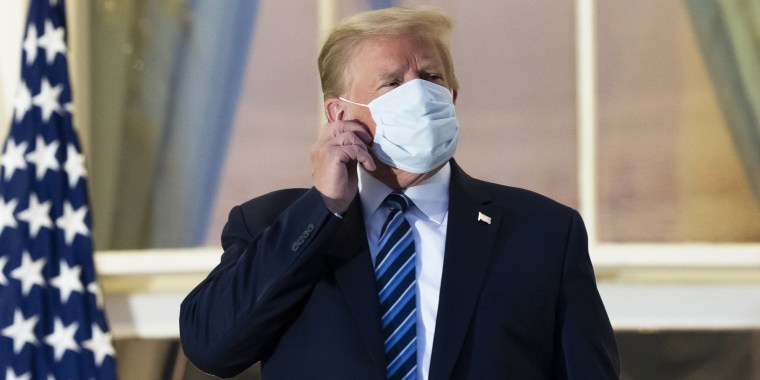President Donald Trump's physician said Wednesday that the president has COVID-19 antibodies, though experts say it’s unclear what this means for his recovery.
"Of note today, the President's labs demonstrated detectable levels of SARS-CoV-2 IgG antibodies from labs drawn Monday, October 5th," Dr. Sean Conley wrote in a public memorandum, referring to the virus that causes COVID-19.
Full coverage of the coronavirus outbreak
But medical experts — who have not personally treated the president — said the mere fact that antibodies were detected in Trump's blood does not provide a good explanation of how the president is truly recovering.
"It doesn't tell us if he's neutralizing the virus. It doesn't tell us if he's infectious or not. It doesn't tell us if he will have long-lasting immunity," Dr. Todd Rice, an associate professor in pulmonary and critical care medicine at Vanderbilt University Medical Center in Tennessee, said.
Antibodies are produced by the immune system in response to germs, and are generally a sign the body is fighting an infection.
Rice said that it usually takes about two weeks for patients to develop IgG antibodies, though it is possible to produce them within a week. Another type of antibody, IgM antibodies, are detected sooner — after the onset of an infection — before fading away.
A likelier explanation for the presence of COVID-19 antibodies in the president's blood is that Trump received a direct infusion of them last Friday in the form of Regeneron's experimental monoclonal antibody cocktail.
Dr. Eric Topol, director of the Scripps Research Translational Institute in California, tweeted Wednesday that "the patient had a whopping (8g) dose of a #SARSCoV2 neutralizing IgG antibody cocktail. Then they detected antibodies. You must be kidding me, Dr. Conley?"
The Regeneron drug consists of two lab-made antibodies designed to mimic the body’s own immune response to the coronavirus.
A Regeneron spokesperson told NBC News that "given the volume of IgG antibodies delivered in our therapy, and the timing of these tests, it is likely that the second test is detecting REGN-COV2 antibodies."
Another drug that the president received, an antiviral called remdesivir, would not explain the antibodies detected in his blood.
Whether Trump's IgG antibodies came from a lab or his own immune system may not make much of a clinical difference in the long run, Rice said. Indeed, the purpose of the monoclonal antibody treatment is to jumpstart a patient's immune response to the virus.
Conley's letter also stated that the president hasn't had a fever for more than four days. But again, it's not an indication of how Trump is recovering.
"That's not an interesting fact," Dr. Ashish Jha, dean of the school of public health at Brown University, told MSNBC. The president is also taking a steroid called dexamethasone, which is known to bring down fevers.
"They keep giving us information that any physician can fact check. It's not as useful as they are suggesting," Jha said.
